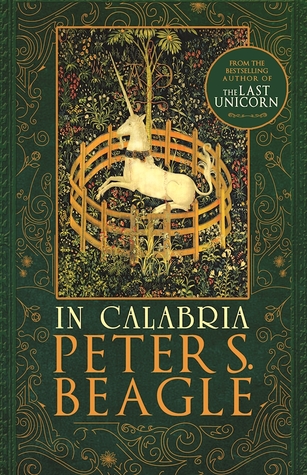Peter Beagle is one of the most highly revered authors of fantasy, especially among other authors. The Last Unicorn is a hugely acclaimed and beloved classic (also an animated movie), but his other novels are not as well-known. He still writes, and In Calabria is his latest novel.
Incidentally, it is about a unicorn. Or rather, it is a novel about the impact a unicorn has when it appears one day in the back yard of a cranky old farmer in the Italian region of Calabria.
Our hero, Claudio Bianchi, is just the right sort of curmudgeon. He grizzles and growls, but without any malice. He's virtually a hermit, content to live at the outermost edge of society, but cares deeply about the animals he tends to. His only regular human contact is the postman, who teasingly asks Claudio about his poetry on a daily basis. Beagle knows how to create authentic reality by zooming in ever so briefly on the minutest, but most human detail, and this gives a richness to the flavour of his stories.
Two things change in Claudio's life: the unicorn appears, and, coincidentally. the postman's younger sister takes over responsibility for delivering the mail on Fridays.
In Calabria is a lovely novel. Even though it is set in the present, it has a strong sense of the Romantic (in the sense of the Romantic period of literature & art) and a yearning for magical beauty. It is also a novel about a curmudgeon slowly softening up, and a novel about defiance against evil. That said, it is not quite as wonderful as the recently published Summerlong: the story has fewer characters to play with, and, though unfathomable, the unicorn does not have the same charisma as Summerlong's Lioness...
Rating: 4/5
Sunday, 27 November 2016
Sunday, 20 November 2016
After Atlas by Emma Newman
After Atlas is set in the same universe as Planetfall, but it is neither sequel nor prequel. It can be read as a standalone novel, but I rather suspect that it is the start of a separate strand of story, which will eventually meet up with story strand from Planetfall - I think Emma Newman is planning some huge opus in this universe.
Anyway.
After Atlas is the story of Carlos Moreno, a hard-nosed far-future homicide detective with a complicated personal history, who is assigned a gruesome case that is intimately interwoven with that history. He's the left-behind son of a woman who was on the interstellar Atlas spaceship that left Earth 40 years ago. He was, briefly, member of a cult that turned its back on the internet and technology. And, after fleeing from the cult, he became a refugee and ultimately a slave.
Stories don't get much more noir than After Atlas. Not only is our (enslaved) gumshoe a cynical lone wolf, not only is the locked room mystery grim and brutal, but the world is cruel and unforgiving, and the grotesquely gory case is just a bloody symptom of a larger, deeper corruption in the world.
After Atlas is very different from Planetfall. Where Planetfall is dominated by its psychological angles (tackling mental illness in a character trying to colonise a planet), After Atlas is much more conventional. There is a tangential element of mental health stuff going on (Carlos uses meditative practice to ground himself when he gets into situations he struggles to cope with), but for the first half of the book, solving the crime is really the be-all and end-all of the story. The second half - well, let's say that the story simultaneously widens out and narrows down in very unexpected ways.
What it does have in common with Planetfall is that this is not a feel-good novel. It's an intelligent, well-written and tense one, but it puts you through the wringer. Ultimately, its view of humanity and society is much more bleak than that of even the grimmest film noir. Worth a read, but be prepared for a tough time.
Rating: 3.5/5
Anyway.
After Atlas is the story of Carlos Moreno, a hard-nosed far-future homicide detective with a complicated personal history, who is assigned a gruesome case that is intimately interwoven with that history. He's the left-behind son of a woman who was on the interstellar Atlas spaceship that left Earth 40 years ago. He was, briefly, member of a cult that turned its back on the internet and technology. And, after fleeing from the cult, he became a refugee and ultimately a slave.
Stories don't get much more noir than After Atlas. Not only is our (enslaved) gumshoe a cynical lone wolf, not only is the locked room mystery grim and brutal, but the world is cruel and unforgiving, and the grotesquely gory case is just a bloody symptom of a larger, deeper corruption in the world.
After Atlas is very different from Planetfall. Where Planetfall is dominated by its psychological angles (tackling mental illness in a character trying to colonise a planet), After Atlas is much more conventional. There is a tangential element of mental health stuff going on (Carlos uses meditative practice to ground himself when he gets into situations he struggles to cope with), but for the first half of the book, solving the crime is really the be-all and end-all of the story. The second half - well, let's say that the story simultaneously widens out and narrows down in very unexpected ways.
What it does have in common with Planetfall is that this is not a feel-good novel. It's an intelligent, well-written and tense one, but it puts you through the wringer. Ultimately, its view of humanity and society is much more bleak than that of even the grimmest film noir. Worth a read, but be prepared for a tough time.
Rating: 3.5/5
Subscribe to:
Posts (Atom)

